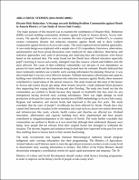| dc.description.abstract | ABILA ERESU STEPHEN (2014-MO92-40001)
Disaster Risk-Reduction: A Strategy towards Building Resilient Communities against Floods in Amuria District, a Case Study of Acowa Sub-County.
The major purpose of this research was to examine the contribution of Disaster Risk- Reduction (DRR) towards building communities resilience against Floods in Amuria district, Acowa Sub-county. The specific objectives were; to examine the state of peoples‟ livelihood‟s, to examine various community disaster risk reduction measures against floods and to show resilient communities against floods in Acowa sub-county. The study employed mixed method approaches. A case study design was employed with a sample size of 151 respondents. Interviews, observation, questionnaires and focus group discussions were employed for data collection. Descriptive and statistical approaches were used in processing and analysing data and conclusions were drawn based on the analysed data. The study found out that floods have affected education especially pupil‟s learning in Acowa sub-county, damaged crops like cassava, schools and children were the most affected. The cause of their (children) vulnerability was because of over dependence on parents for basic needs and the homesteads being located near the wetlands. Results indicated that most community members use scientific early warning information for planning. However, it was discovered that it was not a very effective measure. Wetland restoration, afforestation and capacity building were identified as very important risk reduction measures against floods; these measures contributed to conservation of the natural resources. The study found out that most of the houses in Acowa sub-county always get damp; these houses, however, could withstand flood pressures thus supporting their coping ability during and after flooding. The study also found out that the communities are resilient to floods because they depend on foodstuffs that they store for any emergencies having received early warning information. There was slight damage on food production in the past five years after the introduction of DRR methodology in Acowa Sub-county. Hygiene and sanitation, and income levels had improved in the past five years. The study concludes that the state of people‟s livelihoods has been affected by floods. Floods have also caused food insecurity situation in the community and crops such as cassava are mainly destroyed, and infrastructure like roads, schools, health centres and churches are affected too. Wetland restoration, afforestation and capacity building have been implemented and have greatly contributed to mitigation/adaptation to the impacts of floods. The study further concludes that communities are resilient to floods as it was noted that although their settlements (houses) were damp, most people did not relocate from their original homes but managed to withstand the situation. The income, hygiene and sanitation levels of people have improved in the past five years thus enabling them to bounce back to their normal functioning.
The study recommends that Uganda National Meteorological Authority should integrate indigenous early warning information into their programming. The Ministry of Agriculture, Animal Industry and Fisheries needs to train the agricultural extension workers at sub-county level to disseminate early warning information to farmers. The Office of the Prime Minister should decentralise emergency coordination centres for quick rapid assessments and response. The 18
Ministry of Labour and Social Development should conduct adult literacy learning programmes in order to improve on the literacy levels of people at sub-county level.
Key Words: Disaster Risk-Reduction, Communities, Floods, Amuria District. | en_US |


